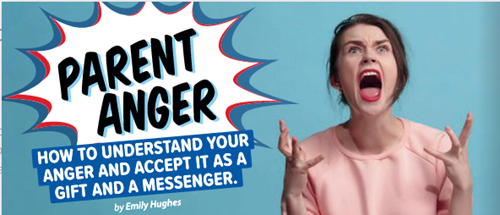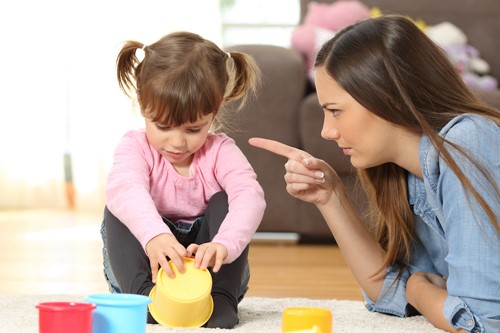Parent Anger: How To Understand Your Anger and Accept it as a Gift and a Messenger
Written by Empowered Parenting Coach Emily Hughes.

Anger is an emotion that comes with a lot of social and cultural baggage and this is even more acute when we are triggered by our children. It’s not uncommon for me to hear in my parent coaching practice, parents who rarely felt anger before they had children express their shock at how enraged they often feel since becoming a parent.
At the root of this anger lies a truth; before having children most of us felt largely in control of our lives… then kids come along… and as much as you might try, you can’t actually control another human being (i.e. your child) and nor, if you truly think about it, is “control” desirable.
You can control the environment and the boundaries, you can control your responses, but can you control your child? Guide, coach, teach, nudge, create loving boundaries, encourage? Yes… but control?…No.
When parents accept this, anger dissipates and there is a truth that becomes evident; the less angry we are with our kids, the less reactive our children are with us. Children are mirrors to what we model to them.
People can get caught up in thinking that if they don’t “control”, then their children will be “out of control” and the “permissive parenting alarm” goes off. But it's worth remembering that from the root word discipline comes the word disciple. A disciple is “a follower of a teacher”. Controlling parents don’t create disciples and neither do permissive parents. If we are using anger as a tool to control then we are encouraging our children to obey from a place of fear. Fear is disempowering and ultimately it teaches our children to either be passive and give up or to fight back.
What is your relationship with anger?
Are you overwhelmed by your anger or do you squash and repress it?
How you were allowed to/ not allowed to express your anger as a child can have a big impact as to how you feel about it as an adult. Whatever baggage you have around anger, here's an invitation, a fresh way to think about it;
Anger isn’t bad. Anger is a gift to let you know when your values, expectations or boundaries have been crossed.
I work with lots of parents who are confused by their anger and, because they are confused, they get stuck. They don’t want to be so reactive, but fear and shame keeps them trapped in a cycle of reactivity.
Let’s take an example of a parent who gets triggered at meal times. They make a healthy, nutritionally balanced meal and have made all attempts to try and make it as accessible as possible; such as cutting the carrots in exactly the way their child likes it. Upon serving the meal, the child says, “It’s disgusting!” and refuses to sit down.
The parent feels a hot rage come over them.
Before they know it, the stress hormones cortisol and adrenaline are flooding their system. Ugly labels start to enter the parents' thoughts: “Spoilt, Fussy, Ungrateful”. Before they know it, they are yelling.
All of this happens in the space of around 10 seconds.
Let's stop: what’s really going on here?

Value Violation: The parent has a value (consciously or unconsciously) on health, nutrition, respect and/or togetherness. That value is seemingly being flouted by the child (who likely is unaware of the value - or not developmentally capable of understanding the value).
Boundary Violation: The parent has boundaries such as, "We sit down to eat and try a variety of foods" which in their mind have been violated by the child. Children need boundaries, but children also need a lot of help to understand and meet those boundaries. Sometimes our boundaries, such as trying new foods, might not feel safe for a child, so our job is to help them to feel safe so they can thrive within our boundaries.
Fear in Disguise: Associated or underneath the anger might be fear: “If my child doesn’t eat, they won’t grow/be healthy”, or “If my child doesn’t obey then we will be out of control”. Fear gives the parent the urge to control in the misguided belief that “if I can control everything then I will be safe”.
Shame in Disguise: Associated or underneath the anger might be shame (the feeling that we are inherently and fundamentally flawed and unacceptable): “If I can’t get my child to sit at the table and eat a healthy meal, then I must be a failure”, or “I’m fundamentally not good enough”.
Overstimulation: Acoustics in kitchens are terrible. Sound bounces off walls and hard surfaces, and sensitive parents can easily get sensory overwhelm. When we are sensorially overwhelmed, our nervous systems move into fight/flight and from this state anger can follow.
Healthy Anger Expression
Once you understand your anger, everything changes. Ideally, the pathway is to get less angry in the first place, but if you do get angry (and of course, you are human so you will), how you work through that anger can help you find more peace.
Anger itself is not bad, but how we express or repress it can have consequences.
Think of anger as energy - if we keep all that raw energy in our body and never release it, it doesn’t just go away. It finds a way to come out one way or another.
What does your child do when they are angry?
Watching them might give you some clues as to what you can do, because (with the exception of hitting, kicking etc.) children have an intuitive knowledge of how to release anger from their systems; stomping, clenching fists, growling, running, jumping.
Now, obviously, we don’t want to scare our children - but we do need to give our anger a release.
4 Ways to Work with Healthy Aggression
Anger is a full body experience. If we want to work through it, we need to work with our bodies as well as our minds. Here are a few things you could try:
- Dancing and dance meditation.
- Running or cardio exercise.
- Shaking: Bio-energetic shaking from the Qigong tradition is a wonderful way to release stuck anger and aggression from the body.
- Growling whilst tensing and releasing muscles (without scaring your children of course!)
- Jumping up and down or, if this is too high energy, going up on your tiptoes and dropping down onto your heels can have a similar effect.
Remember - anger isn’t bad, nor does being angry make you a bad parent. It is a messenger, and perhaps it’s time to lean in and listen to what your anger has to tell you in order to start a new more compassionate relationship with it?

Emily Hughes is an Empowered Parenting Coach at www.findingflowparenting.coach
Find her on Tik Tok, Instagram, Facebook and Linked in @findingflowparenting